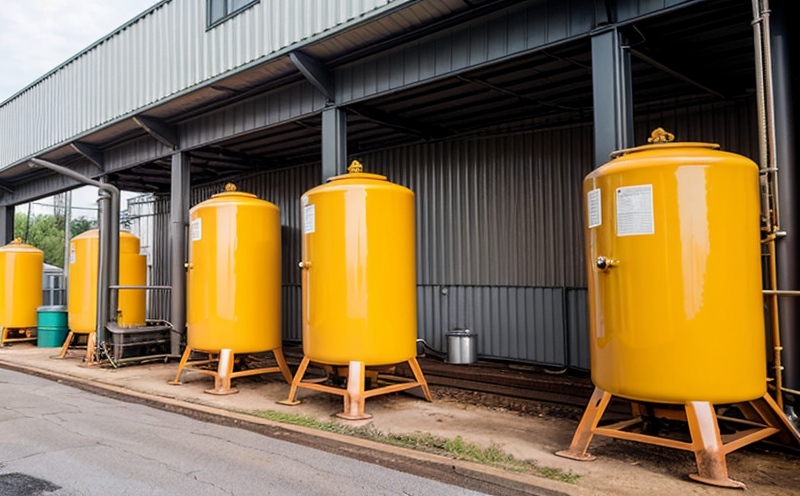ASTM D790 Flexural Property Compliance Testing of Plastics
The ASTM D790 standard is a widely recognized and accepted method used to determine the flexural properties of plastics. This test evaluates how well plastic materials can withstand bending stresses without failing, which is critical for ensuring that the material meets industrial standards and regulatory requirements.
Flexural strength testing is essential in various sectors such as automotive manufacturing, electronics, and construction, where the integrity and durability of plastic components are paramount. By adhering to ASTM D790 guidelines, manufacturers ensure their products meet the highest quality and safety standards.
The test involves bending a rectangular specimen until it fractures. The specimen's flexural strength is calculated by measuring the maximum load applied before fracture and dividing it by the cross-sectional area of the specimen. This ensures that the material can withstand expected operational loads in real-world applications.
Accurate testing requires precise control over variables such as temperature, humidity, and test speed. The appropriate apparatus includes an Instron or other similar mechanical testing machine with a flexure fixture capable of applying controlled bending forces to the specimen.
The specimen preparation is crucial for accurate results. Specimens must be cut to the correct dimensions specified in ASTM D790 (typically 4 inches long, 1 inch wide, and 0.5 inch thick), sanded smooth on all surfaces, and allowed to acclimate to room temperature conditions before testing.
After the test is complete, detailed reports are generated. These reports include not only the flexural strength but also other important metrics such as modulus of elasticity (Young's Modulus) and deflection at a specified load or displacement. Reporting tools like Excel spreadsheets or specialized software can be used to compile results.
For plastics that do not meet ASTM D790 standards, further investigation into raw materials, processing methods, or test parameters may be necessary. Understanding these nuances helps in identifying and resolving any issues leading to non-compliance with industry specifications.
In summary, ASTM D790 flexural property compliance testing is an essential step in the quality assurance process for plastic materials used across many industries. It ensures that products meet stringent performance criteria set by international standards bodies like ASTM International.
Applied Standards
- ASTM D790-18 Standard Test Method for Flexural Properties of Unreinforced and Reinforced Plastics and Resins
This standard specifies the procedure for determining the flexural properties, including flexural strength, modulus of elasticity (flexural), and deflection at a specified load or displacement. It covers both unreinforced and reinforced plastics and resins.
The ASTM D790-18 standard is widely used in industries such as automotive manufacturing, electronics, construction, packaging, and consumer goods where plastic components are subjected to mechanical stresses during use. Compliance with this standard ensures that the materials employed meet rigorous quality standards set by industry leaders.
Industry Applications
- Automotive Manufacturing: Ensures safety and durability of components like dashboards, seat frames, and structural elements.
- Electronics: Validates the strength of casings for electronic devices to protect against mechanical damage.
- Construction: Guarantees the integrity of building materials such as window sills, beams, and other structures exposed to bending stresses.
- Packaging: Ensures that packaging components withstand stacking pressures during shipping without compromising structural integrity.
- Consumer Goods: Validates product safety by ensuring that components like handles or grips can endure expected loads without breaking.
These applications highlight the critical role ASTM D790 plays in maintaining high standards for plastic materials across diverse sectors. By adhering to this standard, manufacturers ensure their products are reliable and safe for end users.
Eurolab Advantages
At Eurolab, we provide comprehensive ASTM D790 flexural property compliance testing services that meet the highest standards of accuracy and reliability. Our state-of-the-art laboratories equipped with advanced testing equipment ensure precise measurements and reproducible results.
We employ experienced technicians who are certified in conducting this type of testing according to ASTM D790 guidelines. This ensures consistent quality throughout all tests, providing clients with confidence in the integrity of their product development process.
Our services extend beyond just performing the test; we offer expert advice on specimen preparation and interpreting results based on industry best practices. Additionally, our flexible service offerings allow us to accommodate different client needs whether it's one-off testing or ongoing quality control programs.
Beyond technical expertise, Eurolab offers a range of additional services including material characterization, failure analysis, and custom testing protocols tailored specifically for unique project requirements. Our goal is always to help clients achieve their goals by delivering accurate, reliable data that supports informed decision-making processes.





